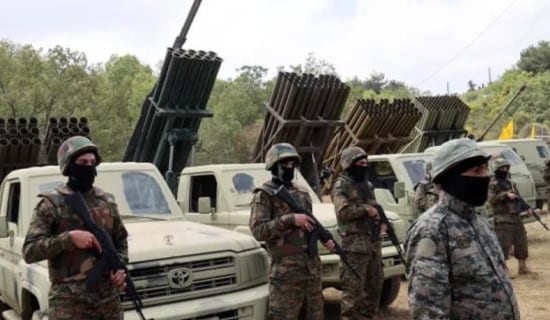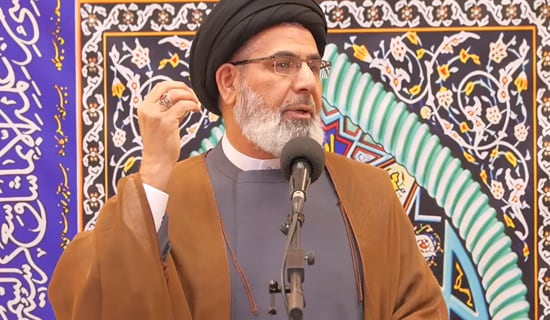On November 11, 2019, Russian Security Council Secretary Nikolai Patrushev published a programmatic article in Rossiyskaya Gazeta, a Russian newspaper published by the Government of Russia. In the article Patrushev underlined that a polycentric world order is emerging, and that the West, the traditional pole power, is gradually getting weaker.
Patrushev warned that the United States had not reconciled itself to this turn of events and was fighting tooth and nail to reverse this process. The West has therefore trying to contain Russia and replace international law with a "rules-based order".
The argument that the West and particularly the US were leading an assault on international law was also enunciated by Russian FM Sergey Lavrov. On November 27, speaking at the Kyrgyz Foreign Ministry's Diplomatic Academy, Lavrov said: "This reflects a strategy adopted by the United States and its closest allies. They consistently disregard and undermine international law that implies legally binding, universal and universally coordinated approaches (in the shape of conventions, etc.). They do not even use the term 'international law;' instead, they say 'rules-based world order.' This seems to be one and the same thing, but in practice they are inventing the rules, which they refer to, for their own convenience every once in a while."
In the article, Patrushev explained that his job, as Russia's Security Council Secretary, is to identify scenarios for global development, in order to preserve a role for Russia. The Strategic forecast of the Russian Federation has already identified four possible scenarios that may mature in the next 15 years. The first is the transition to a polycentric world order. The second is the continuation of the US attempts to preserve its dominance. The third is the formation of a bipolar world order. And, the fourth development scenario is the enhancement of regionalization processes.
In light of this assessment, he concluded that priority attention should be given to preserving Russia's sovereignty and independence, and developing organizations that promote the formation of a polycentric world order: the Eurasian Economic Union (EAEU), the Collective Security Treaty Organization (CSTO), the Shanghai Cooperation Organization (SCO) and BRICS.
Below is Patrushev's article:[1]

(Source: Nakanune.ru)
"In the contemporary world, ensuring the security of the state and society requires the constant formulation of numerous and frequently highly complex decisions in the areas of defense organization, the functioning of the defense industry, military-technical cooperation, and the protection of the constitutional system, sovereignty and territorial integrity. Today, given the ever-increasing complexity of the international situation, taking such decisions is impossible without comprehensive analytical work. We are talking about preparing forecasts and scenarios for the future.
"The Strategic forecast of the Russian Federation until 2035 is comprised of four possible scenarios for the development of the global situation. They are as follows: the first of them is the transition to a polycentric world order. The second is the continuation of the US attempts to preserve its dominance. The third is the formation of a bipolar world order. And, finally, the fourth development scenario is the enhancement of regionalization processes.
"It is important to understand that the objective geo-political reality is significantly more complicated than any abstract schemes. No single forecast can be fulfilled with 100% accuracy, thus we are talking about dominance of certain trends in the contemporary world. So, in the contemporary world, there are no doubts that trends are appearing [presaging] the emergence of a polycentric world order architecture.
"We are talking about the emergence of a new world and regional centers of economic and political influence, whose share in global trade and in the international political coordination system is growing steadily.
"'China claims to be the leading world power of today, while India, Brazil and South Africa have steadily established themselves as leaders in their regions.'
"In particular, China is competing to be the leading word power, and countries such as India, Brazil and South Africa have confidently established themselves as leaders in their respective regions. Without considering the viewpoint of the aforementioned players, it's impossible to solve global problems.
"At the same time, the positions of the traditional poles of power are gradually weakening – first of all in the West. Although the US, the EU, and Japan remain the most influential world economic centers, their prospects are gradually deteriorating given the unfortunate demographic situation and exhaustion of intensive economic growth options.
"The currently observed loss of influence of G7 group amidst the G20's enhanced role and authority is also a consequence of the aforementioned processes.
The US: Prospects For Preserving Global Hegemony
"Obviously, the emergence of a new world and regional centers of power did not suit the traditional centers of power – primarily the United States and the so-called collective West, led by the United States.
"In the 1990s, the Americans assumed that Russia was a total write-off, and China, despite of its economic success, would be unable to claim the status of a top level world power. This created the illusion that the liberal world order, based on American hegemony, would prevail forever.
"Yet, by the end of 2010s, Russia has succeeded to rapidly restore its potential and recoup its previously lost influence in the international arena. China, for its part, began to confidently challenge the status of the US as the global economic leader. Today, China already generates a larger GDP (at purchasing power parity) than the US. Other countries as well started to aspire to gain a role as global economic leaders, primarily India, which has also began expressing its political ambitions. Under these conditions, it became obvious to the White House that its geopolitical strategy required a serious adjustment.
Containment Strategy For Russia And China
"In December 2017, D. Trump approved the new US National Security Strategy.[2] The doctrine openly states that Russia and China are challenging US power, influence, and interests, trying to undermine US security and well-being. The strategy underlines that both countries "are determined to make economies less free and less fair, to grow their militaries, and to control information and data to repress their societies and expand their influence.' In this context, three main areas were identified as priority areas for the containment of Russia and China: the military-political field, the economy, and the information-communication field.
"Thus, based on these [priority areas], we regularly assess and forecast the situation in each of these areas, in order to determine the main tasks for ensuring national security for the Russian Federation.
Military-Political Threats
"The military-political security of Russia, as well as of the rest of the world, is characterized today by the growing risks and lowered predictability, associated with the dismantlement of the current strategic stability architecture and weapon control mechanisms, as a result of the US unilateral decisions and the American aspiration to get rid of the international legal framework, which limits Washington's military capabilities.
"'Essentially the US is trying to substitute the current international legal system with an alternative 'rule-based order'.'
"In this regards, the INF treaty is indicative. By starting the process of dismantling it, the Americans predictably attempted to blame Moscow for that. The US refrained from explaining the exact nature of Moscow's fault. Yet, after exiting the treaty, the US, in a matter of weeks, tested [its first] ground-launched cruise missile, which proves that Washington prepared beforehand to withdraw from the treaty.
"In the same category as the collapse of the INF Treaty, are the United States' withdrawal from the ABM Treaty in 2002, Washington's reluctance to ratify the Comprehensive Nuclear Test Ban treaty and work to extend the [START] Treaty to further reduce and limit strategic offensive arms, as well as the recent announcement regarding the cancellation of the Open Skies Treaty. All this negatively influences the ability to predict the military-strategic situation, leading to a lowered threshold for the use of nuclear weapons, and thus many fold increasing the risks for all of mankind.
"Obviously, when the United States designates Russia as a military threat, the White House chooses to forget the fact that the US military budget, which amounted to about 716 billion dollars in 2019, is more than 15 times larger than the Russian one.
The Economic Sphere
"The world economy faces serious challenges, which directly threaten the well-being of Russia and its citizens. This is primarily caused by the increasing US attempts to obtain unilateral advantages in world trade, not via transparent competition, but through the imposition of sanctions, the unleashing of trade wars, exterritorial application of its own legislation, [and] illegal exploitation of the resources of sovereign countries.
"More broadly, we are witnessing a large-scale structural reconfiguration of the world economics. The driving force behind this process are the changes in technological developments in production, primarily the emergence of new technologies in the industry and energy sectors, in communication, in the bio- and nanotechnology spheres, robotics, redeployment of production forces, and the changing demographic characteristics.
"The transformation of the world economic order affects the commodity, financial, technological, and labor markets, as well as the national governance system. The importance of human capital as a factor in an economic led development of states is growing. The effective incorporation of the Russian economy in these processes is an important task in terms of ensuring national security for the long term.
Virtual And Real Wars
"There are also serious risks arising in the sphere of information and communication technology. In this area, it is often observed that [the West] ignores the sovereign rights of states to develop their own technological base for critical communication infrastructure, including under the banner of strengthening the digital potential of the developing countries and exercising control over national internet segment. In the interests of Western intelligence services, the introduction and use of hidden malicious functions [software bugs], [and planting software] security vulnerabilities in IT products are being carried out.
With regard to the CIS and the CSTO, the West consistently conducts a policy aimed at destroying the single humanitarian space.
"A particular danger is the line taken by the West to use information and communication technologies for military-political purposes, in order to carry out hostile actions aimed at undermining the sovereignty of individual states.
"Such model of actions is, in particular, provided by the US National Cybersecurity Strategy, which proclaims the principle of 'preserve peace through strength', that means the willingness to resort to all kind of existing military capabilities in response to a cyber attack on US computer information networks. Moreover, the US have repeatedly clarified that they will assign guilt for these attacks in an arbitrary manner.
"In general it is becoming clear that Washington intends to use its technological leadership in order to preserve strategic dominance in informational sphere, by actually pursuing a policy of imposing its conditions on states that are lagging behind in digital development. Experts define such practice as 'informational neocolonialism'. With that goal in mind, the Americans actively hamper the consolidation of international law provisions on the use of information and communication technologies exclusively for peaceful purposes and agreements aimed at preventing conflicts in the information sphere.
Terrorism And Controlled Chaos Technology
"Many of the aforementioned approaches and strategies that Washington is trying to promote globally, have already been tested in different regions, primarily in the Middle East, which has essentially turned into a proving ground of American geopolitics. It is in this region that the technologies of 'controlled chaos' and 'hybrid war' were widely used and fine-tuned to perfection.
"The best examples of such kind of implementation are the operations targeted at the elimination of Saddam Hussein in Iraq, the attempts to topple Bashar Assad in Syria, and the events of the 'Arab Spring'. Such actions led to an unprecedented rise of international terrorism and Islamic extremism.
"The US and its allies use the very fight against terrorism to promote their own interests and priorities. So, we see how the Americans are imposing on other nations their concept of countering violent extremism, even though [this concept] not only ignores the UN anti-terror legal framework, but also allows interference into the internal affairs other sovereign states' under the pretext of supporting the civil society confronting authoritarian regimes, whose actions are presumably the root cause for the spread of radical views.
"At the same time, under the banner of combating the spread of terrorist activity, the US and several other countries are bolstering their military presence in different regions of the world.
The Threats That CIS Countries And The Collective Security Treaty Organization Are Facing
"With regard to the CIS [Commonwealth of Independent States] and the Collective Security Treaty Organization [CSTO], the West has been consistently pursuing a policy aimed at destroying this united humanitarian space and further disunity amongst peoples. Nationalism, neo-Nazism, and explicit Russophobia are being incubated [by the West], the Russian language is being discriminated against, the shared history of CIS countries is being distorted and demonized.
"Of particular concern are the Pentagon's efforts to establish biological laboratories all over the world and especially in CIS countries, where they research infectious diseases, and may create biological weapons. In this context we need close cooperation with our partners, including through the signing of bilateral agreements concerning biological security.
Alternative To The UN
"All the aforementioned factors lead to a considerable rise of conflict potential in the world. Essentially, the US is trying to substitute a kind of alternative 'rule-based order' for the current international legal framework.
"While assessing such actions, it is important to take into consideration that the international legal architecture has been designed by the whole international community over the last decades. This architecture embodies the collective experience of an entire mankind, including the tragedy of the two world wars.
"According to this architecture, the role of supreme arbiter in international affairs is assigned to the UN, and the use of military force, economic or political pressure is illegal without a UNSC decision. In the current international legal framework, which provides for the equality of all sovereign states, a division of the world into 'developed' and 'backward' countries, into 'acceptable' and 'objectionable' ('rogue countries') states, and [to divide] terrorists into 'good' and bad ones.
"The key goal of international legal system is to make the world more secure, more predictable and more stable. At the same time, within this system, no one eliminates the concept of national interests and does not in any way limit sovereign states in promoting their interests, as long as the interests of other sovereign actors are unharmed.
"In turn, the concept of 'rule-based order' implies that Washington is the supreme arbiter in the realm of international affairs, which is attentive to UN decisions only when they coincide with its own will. The outbreak of military interventions, the imposition of sanctions against undesirable states and meddling into their internal affairs - all this is being proclaimed as the White House's prerogative.
Right To Security
"In the given conditions, the world's countries are becoming increasingly aware that only a collective response may be provided for the aforementioned threats. In recent years, a growing interest by sovereign countries in various regions of the world in creating, both regionally and globally, a modern system for ensuring stability, based on an equal and undivided system - as opposed to the idea of security, being promoted by the US, as an 'exclusive' benefit for those countries that are ready to play by Washington's rules, has been recorded.
"Among traditional US' partners and US' most loyal partners in the Euro-Atlantic region, there is also a growing awareness that thoughtlessly following Washington's lead could have catastrophic consequences. For example, the suspension of the INF Treaty by the US made it clear to the Europeans that the White House, by pursuing its private interests, is ready to easily compromise its allies' security.
Defending Russia From Hybrid [Warfare] And Other Threats In The Medium-Term
"According to our assessment, priority attention should be focused on preserving and strengthening the constitutional system, sovereignty, independence, and territorial integrity of Russia, given the employment of hybrid warfare against our country.
"Simultaneously, it is important to ensure the implementation of the current [system] and create additional competitiveness capabilities for the Russian economy, further bolster our global economic presence, and begin transitioning to long-term sustainable social-economic development.
"The task of strengthening Russia's defense capabilities is also most relevant. That includes maintaining nuclear deterrence forces at the necessary level for ensuring national security.
"No less important is promoting a pragmatic and multi-faceted foreign policy, including deepening equal rights partnerships with other players and the development of interstate associations– the Eurasian Economic Union (EAEU), the Collective Security Treaty Organization (CSTO), the Shanghai Cooperation Organization (SCO) and BRICS.
"Russia will also work to strengthen the current international legal system, the global and regional architecture of strategic stability, to develop mechanisms of collective security with the UN playing the leading role, as the supreme arbiter of interstate relations.
"Among the key priorities of our country in the field of security is the further strengthening of the unequivocal fight against the global terror threat, not only inside Russia and along the perimeter of its borders, but also in faraway regions.
"Additionally, national interests and state security will be provided and defended in the information and communication sphere.
"Successful work in these areas is the key to Russia's sustainable socio-economic development, in order to improve the living-standards of Russian citizens, and to preserve and enhance the unique cultural and spiritual order, and historical heritage of our country."
[1] Rg.ru, November 11, 2019.








